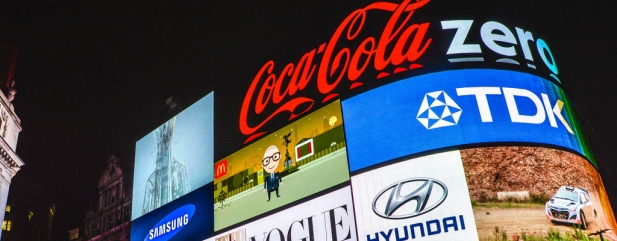Archived article
Please note that tax, investment, pension and ISA rules can change and the information and any views contained in this article may now be inaccurate.
Buying brands through investment trusts

According to WPP’s (WPP) annual BrandZ Global Top 100 Most Valuable Brands report for 2017, the value of the Global Top 100 increased 8% year-on-year to $3.6trn despite a year of grand geopolitical surprises.
WPP says the value of the BrandZ Strong Brands Portfolio, a subset of the Brandz Top 100 Most Valuable Global Brands, increased 124.9% over the 12 years between April 2006 and April 2017, outperforming both the S&P 500 and the MSCI World Index.
This demonstrates that valuable brands deliver superior shareholders returns, even during periods of market volatility. WPP’s list is headed up by US tech giants Google, Apple, Microsoft, Amazon and Facebook, while Samsung, Home Depot, Wal-Mart and Zara also feature.
Investors can access the earnings power of the strong brands and franchises they encounter in day-to-day life and engage with in their daily lives through investment trusts.
Trusted options
Zara is owned by through owner Inditex, the world’s biggest clothing retailer. You can gain exposure through the James Anderson and Tom Slater-steered Scottish Mortgage Investment Trust (SMT).
Another enthusiastic backer is Henderson EuroTrust (HNE), whose manager Tim Stevenson has held Inditex, whose other brands include upmarket label Massimo Dutti, in the portfolio since its 2001 IPO. ‘Inditex has a significant sourcing advantage over its peers,’ explains Stevenson.
‘By using a lot more local/near-local sourcing, it is able to achieve a quicker time-to-market for new products. Inditex has a tiny market share in a very fragmented global clothing market and we believe it can continue to grow store count materially over the long term. The valuation of this business has never been cheap, but rightly so; it is a high return business that has plenty of capital deployment opportunities.’
Elsewhere, investors can gain exposure to popular retail and restaurant chains through JPMorgan American (JAM), managed by Garrett T. Fish and Eytan Shapiro and currently trading at a 4.5% discount to NAV.
The trust is invested in Ontario-based Restaurant Brands, which operates Burger King outlets and the Canadian coffee and doughnut chain Tim Hortons, which recently opened its first UK branch on Argyle Street in Glasgow.
JPMorgan American also holds Walgreens Boots Alliance, the pharmacy-led health and wellbeing company behind Boots, not to mention ASDA’s parent Wal-Mart, the world’s largest retailer investing heavily in building its e-commerce business.
Through F&C Commercial Property Trust (FCPT) investors can access a share of the rents paid by luxury retailer MCM to T K Maxx and Uniqlo, the clothing chain owned by Japan’s Fast Retailing. Founded by Tadashi Yanai, one of Japan’s richest men, Fast Retailing has said it plans to overtake Inditex as the world’s biggest apparel retailer.
Nicholas Price, manager of Fidelity Japanese Values (FJV), identifies another Japanese brand that could boost portfolio returns.
He writes: ‘Against the backdrop of a stagnant domestic economy, we have seen Japanese companies with great brands or technologies successfully expand into Asia. As these companies transform themselves from stable domestic cash generators to Asian growth stories, there is a good chance for valuation multiples to be re-rated. The challenge of trying to capture these changes is a great motivator that can prove highly rewarding.’
Price says ‘one such example is Ryohin Keikaku, the operator of the MUJI brand of general merchandise stores and one of Japan’s fastest growing speciality retailers. MUJI literally means “no brand”, which is the antithesis to mass consumption and is grounded on a strong philosophy.
For example, product development consistently entails selecting materials, streamlining processes, and simplifying packaging, which leads to low prices relative to quality and less direct competitors in the market. Ryohin Keikaku’s strong brand positioning underpins the stability of its domestic business and enables the company to gradually increase unit prices.
‘Overseas growth is centred in East Asia, particularly China, where it operates a network of 200 stores and is opening around 30 new outlets per year. Furthermore, among Japanese retailers Ryohin Keikaku delivers relatively high shareholder returns, targeting a payout ratio of 30% and returns on equity in excess of 15%.’
Through the Martin Currie Asia Unconstrained Trust (MCP), investors can gain exposure to Samsung. Portfolio manager Andrew Graham explains: ‘Samsung is the world’s largest smartphone manufacturer, the dominant manufacturer of DRAM memory chips needed in those smartphones as well as PC’s and servers, one of only a handful of NAND flash suppliers with a clear technology lead over everyone else, and even the world leader in TV’s.
Two years ago the market was extremely worried about the profit margins on its handsets, which were falling as Android devices became somewhat commoditised. However, in doing so they ignored Samsung’s previously employed strategy in other devices - to drive competitor’s profitability to zero when they know that their manufacturing technology or efficiency can still maintain decent margins.’
Important information:
These articles are provided by Shares magazine which is published by AJ Bell Media, a part of AJ Bell. Shares is not written by AJ Bell.
Shares is provided for your general information and use and is not a personal recommendation to invest. It is not intended to be relied upon by you in making or not making any investment decisions. The investments referred to in these articles will not be suitable for all investors. If in doubt please seek appropriate independent financial advice.
Investors acting on the information in these articles do so at their own risk and AJ Bell Media and its staff do not accept liability for losses suffered by investors as a result of their investment decisions.
 magazine
magazine











